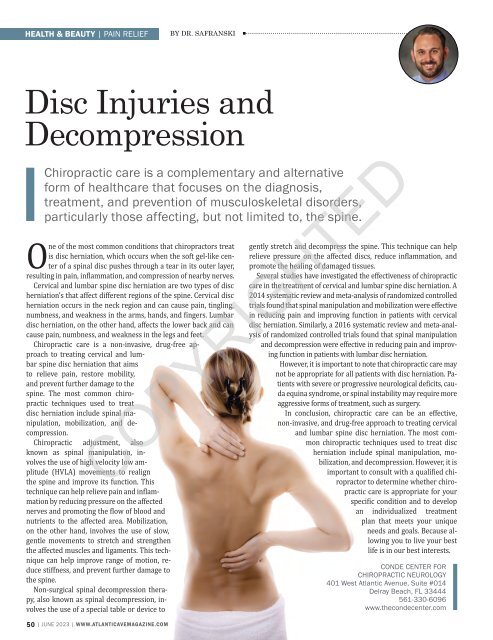You also want an ePaper? Increase the reach of your titles
YUMPU automatically turns print PDFs into web optimized ePapers that Google loves.
health & beauty | PAIn relief<br />
By Dr. Safranski<br />
Disc Injuries and<br />
Decompression<br />
Chiropractic care is a complementary and alternative<br />
form of healthcare that focuses on the diagnosis,<br />
treatment, and prevention of musculoskeletal disorders,<br />
particularly those affecting, but not limited to, the spine.<br />
One of the most common conditions that chiropractors treat<br />
is disc herniation, which occurs when the soft gel-like center<br />
of a spinal disc pushes through a tear in its outer layer,<br />
resulting in pain, inflammation, and compression of nearby nerves.<br />
Cervical and lumbar spine disc herniation are two types of disc<br />
herniation’s that affect different regions of the spine. Cervical disc<br />
herniation occurs in the neck region and can cause pain, tingling,<br />
numbness, and weakness in the arms, hands, and fingers. Lumbar<br />
disc herniation, on the other hand, affects the lower back and can<br />
cause pain, numbness, and weakness in the legs and feet.<br />
Chiropractic care is a non-invasive, drug-free approach<br />
to treating cervical and lumbar<br />
spine disc herniation that aims<br />
to relieve pain, restore mobility,<br />
and prevent further damage to the<br />
spine. The most common chiropractic<br />
techniques used to treat<br />
disc herniation include spinal manipulation,<br />
mobilization, and decompression.<br />
Chiropractic adjustment, also<br />
known as spinal manipulation, involves<br />
the use of high velocity low amplitude<br />
(HVLA) movements to realign<br />
the spine and improve its function. This<br />
technique can help relieve pain and inflammation<br />
by reducing pressure on the affected<br />
nerves and promoting the flow of blood and<br />
nutrients to the affected area. Mobilization,<br />
on the other hand, involves the use of slow,<br />
gentle movements to stretch and strengthen<br />
the affected muscles and ligaments. This technique<br />
can help improve range of motion, reduce<br />
stiffness, and prevent further damage to<br />
the spine.<br />
Non-surgical spinal decompression therapy,<br />
also known as spinal decompression, involves<br />
the use of a special table or device to<br />
50 | <strong>June</strong> <strong>2023</strong> | www.<strong>Atlantic</strong><strong>Ave</strong>Magazine.com<br />
gently stretch and decompress the spine. This technique can help<br />
relieve pressure on the affected discs, reduce inflammation, and<br />
promote the healing of damaged tissues.<br />
Several studies have investigated the effectiveness of chiropractic<br />
care in the treatment of cervical and lumbar spine disc herniation. A<br />
2014 systematic review and meta-analysis of randomized controlled<br />
trials found that spinal manipulation and mobilization were effective<br />
in reducing pain and improving function in patients with cervical<br />
disc herniation. Similarly, a 2016 systematic review and meta-analysis<br />
of randomized controlled trials found that spinal manipulation<br />
and decompression were effective in reducing pain and improving<br />
function in patients with lumbar disc herniation.<br />
However, it is important to note that chiropractic care may<br />
not be appropriate for all patients with disc herniation. Patients<br />
with severe or progressive neurological deficits, cauda<br />
equina syndrome, or spinal instability may require more<br />
aggressive forms of treatment, such as surgery.<br />
In conclusion, chiropractic care can be an effective,<br />
non-invasive, and drug-free approach to treating cervical<br />
and lumbar spine disc herniation. The most common<br />
chiropractic techniques used to treat disc<br />
herniation include spinal manipulation, mobilization,<br />
and decompression. However, it is<br />
important to consult with a qualified chiropractor<br />
to determine whether chiropractic<br />
care is appropriate for your<br />
specific condition and to develop<br />
an individualized treatment<br />
plan that meets your unique<br />
needs and goals. Because allowing<br />
you to live your best<br />
life is in our best interests.<br />
COPYRIGHTED<br />
Conde Center For<br />
ChiroPRACTIC Neurology<br />
401 West <strong>Atlantic</strong> <strong>Ave</strong>nue, Suite #014<br />
Delray Beach, FL 33444<br />
561-330-6096<br />
www.thecondecenter.com

















